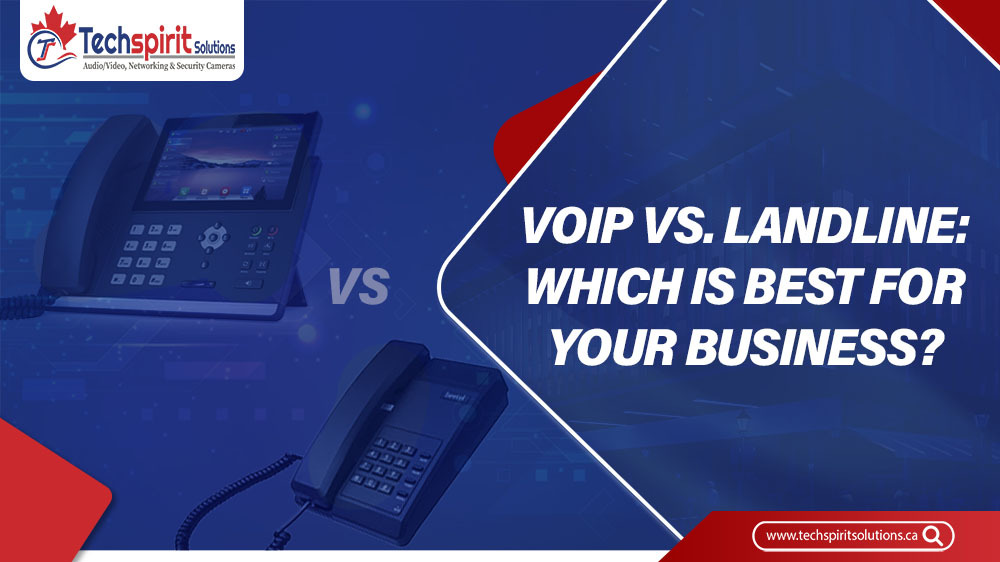Welcome to our exploration of business communication. Today, we’re comparing VoIP and traditional landline systems, diving into the details that set them apart and impact how we connect and collaborate in the business world.
Whether you’re a technology enthusiast or a supporter of traditional communication methods, this expedition promises valuable insights that will reshape your understanding of the business telecommunication world.
Join us as we navigate the world of VoIP vs Landline, where innovation converges with tradition.
Table of Contents
ToggleWhat is VoIP?
Voice over Internet Protocol (VoIP) redefines the way we communicate, replacing traditional landline connections with innovative Internet-based calling solutions. Picture VoIP as your sophisticated ally, transforming ordinary conversations into a seamless digital experience.
Gone are the days of relying on outdated landline systems. VoIP leverages internet connectivity to enable not just voice calls, but also faxes, text messages, and voice messages, all effortlessly transmitted over the internet. In this digital age, VoIP stands out as a beacon of efficiency and convenience, offering a wide range of communication options at your fingertips.
VoIP doesn’t just enhance calls; it provides a comprehensive suite of communication tools. Its intuitive interface and rich feature set make staying connected a breeze, marking a significant advancement in modern communication.
Pros & Cons of VoIP
Let’s dive a little deeper into the exciting world of VoIP, by exploring its pros and cons.
Pros of VoIP System
- Cost Efficiency: VoIP eliminates excessive phone bills, offering cost-effective communication solutions without compromising on quality.
- Enhanced Accessibility: With internet connectivity, communication knows no bounds. Stay linked whether you’re at a quaint coffee shop or a bustling boardroom.
- Total Portability: VoIP accompanies you on your journey, ensuring uninterrupted connectivity regardless of your location.
- Scalability: VoIP adapts seamlessly to your business needs, whether you’re a burgeoning startup or an established corporate entity. It grows in sync with your requirements.
- Advanced Features: From voicemail to video calls and call forwarding, VoIP provides many options, simplifying communication processes.
- Crystal-Clear Voice Quality: Engage in conversations with unparalleled clarity. VoIP delivers impeccable voice quality, ensuring every word is heard distinctly.
- Multitasking Support: VoIP empowers multitasking, allowing you to converse while focusing on your work, enhancing overall productivity.
- Flexibility with Softphones: Customize your communication experience. Softphones grant you the freedom to make calls from your computer or mobile device, tailoring communication to your lifestyle and preferences.
Cons of VoIP System
- Requires Good Internet Connection: A stable internet connection is the lifeline of VoIP, ensuring uninterrupted conversations.
- Needs Continuous Power Supply: VoIP systems need power; no power means no calls, unlike trusty landlines.
- Doesn’t Support Emergency Calls: While VoIP is amazing, it has limitations with emergency calls.
- Susceptible to Network Jitter: Network disruptions can occasionally affect call quality, but fear not. It’s usually a temporary blip.
- Audio Quality Concerns: Occasionally, you might encounter echoes or noise, but these are usually minor and infrequent.
- Security Risks: Stay vigilant! While rare, there’s a chance of security threats, but a good security setup can keep them at bay.
- Additional Expenses : Be mindful of international calls or services outside your VoIP network – they might come with a little extra charge.
What is a Landline?
In the midst of our rapidly advancing digital age, the landline phone remains a symbol of steadfast and reliable communication, preserving the essence of traditional connections.
There are two different types of landline phones available in the market : the steadfast corded phones, where the base and receiver are linked by a resilient cord, symbolizing reliability. The cordless phones, offering freedom within a limited range, although reliant on power and thus silent during blackouts.
Historically, “landline” denoted an unwavering link between two points. Today, it’s the term that differentiates our home phones from the ubiquitous mobile devices we carry everywhere.
With the surge of mobile technology, more people are opting for the freedom of wireless communication, leading to a gradual decline in landline usage. It’s a testament to our evolving connection habits, embracing the convenience of mobile phones and the boundless possibilities they offer.
Pros & Cons of Landline
Here are the pros and cons of landline.
Pros of Landline
- Reliability for Emergencies: Landlines are steadfast during emergencies, ensuring you’re always connected, especially in critical situations.
- Call Quality: Landline facilities clear conversations, free from the hiccups sometimes found in other communication methods.
- Security: Landlines offer a secure channel for communication, providing a sense of privacy and safety.
- Easy to Use and Find: Landline phones are user-friendly and easily accessible, making them suitable for all age groups.
- Good for the Workplace: In offices and businesses, landlines provide a stable, dedicated line for professional communication, ensuring seamless interactions with clients and colleagues.
Cons of Landline
- Long Distance Equals Large Bill: Making long-distance calls via Landline can result in substantial bills, especially for international conversations.
- Telemarketing Spam: Landline numbers are often targeted by telemarketers, leading to unwanted spam calls disrupting your peace.
- Lack of Convenience: Landlines are fixed, restricting mobility and making it challenging to stay connected while on the move.
- No Extra Features: Compared to modern communication methods, landlines lack advanced features like video calls or instant messaging.
- Limited Availability: In some areas, landline services might not be readily available, limiting options for those seeking a reliable connection.
VoIP vs Landline: Exploring the Communication Frontier
In the world of communication, there’s a dynamic showdown between the traditional champion, landline, and the modern, VoIP (Voice over Internet Protocol). Let’s delve into the differences between VoIP vs Landline.
1. Technology
– Landline: Landlines operate on a dedicated physical network, relying on copper wires and phone switches. They’ve been our reliable companions for generations.
– VoIP: VoIP, on the other hand, rides the digital wave, transforming analog voice signals into digital packets that zip through the internet. It’s like magic for your voice!
2. Cost-Efficiency
– VoIP : VoIP takes the crown here, offering affordability that’s 40-80% less expensive than traditional landline services. Say goodbye to hefty bills and hello to savings.
– Landline : Landline costs can generally add up, making them an expensive investment.
3. Flexibility and Mobility
– VoIP : VoIP offers the freedom to choose from a variety of providers, ensuring businesses have options tailored to their needs. It’s like having a buffet of communication services.
– Landline : While VoIP allows for seamless integration with business apps, empowering users with enhanced productivity and data tracking capabilities. Landlines, well, they’re a bit limited in this area.
4. Reliability and Adaptability
– Landline : Landlines, with their closed circuits, are synonymous with reliability. However, VoIP, while usually stable, is internet-dependent, making it slightly vulnerable to connection hiccups.
– VoIP : VoIP scores big on adaptability. It effortlessly accommodates flexible and remote work setups, letting you use your mobile phone as an office extension. Landlines can’t match this level of versatility.
5. Call Quality
– Landline : Landlines, with their dedicated lines, boast impeccable call quality.
– VoIP : VoIP is no slouch either, providing excellent voice clarity.
It’s a close race in terms of call quality.When it comes to choosing between VoIP and landline, both have their own strengths. VoIP shines with its cost-effectiveness, flexibility, and integration prowess, while landlines stand tall with their reliability and exceptional call quality.
It’s an exciting era of communication innovation, where businesses can choose the perfect match for their needs.
Below we’ve provided a quick overview of the differences between VoIP vs Landline phone systems, helping you make an informed choice based on your business needs.
| Aspect | VoIP | Landline |
| Technology | Transmits calls over the internet using IP | Utilizes physical copper wires and cables |
| Cost | Generally lower, cost-effective | Can be costly, especially for long-distance |
| Flexibility | Highly flexible, suitable for remote work | Fixed and limited mobility |
| Reliability | Relies on internet stability, may face power outages | Highly reliable, works during power outages |
| Features | Offers advanced features, integrations | Limited features, basic functionality |
| Scalability | Easily scalable, suitable for growing businesses | Difficult and costly to scale |
| Mobility | Portable, can use mobile devices | Stationary, limited mobility |
| Security | Secure with encryption protocols | Secure, calls transmitted through cables |
| Emergency Calls | Limited support, may lack accurate location info | Supports emergency calls with accurate info |
| Installation | Quick and easy setup, minimal hardware required | Requires professional installation |
| Availability | Widely available, accessible globally | Availability may be limited in some areas |
Which Is Best for Your Business: VoIP vs Landline?
There’s always a confusion behind choosing the right phone system for your growing business – VoIP vs. Landline. By now you’re aware of the pros and cons of both as well as the major differences between them. Now, let’s embark on this exciting journey and find out which one suits your business like a perfectly tailored suit.
The VoIP
VoIP, the digital powerhouse, emerges as the preferred choice for businesses prioritizing flexibility, scalability, and cost-effectiveness. Serving as a gateway to a world where voice data seamlessly traverses the internet, VoIP becomes an indispensable ally for remote or hybrid work environments.
Consider substantial reductions in international call expenses, seamless integration capabilities with various business applications, and a rich array of features such as conference calls. VoIP epitomizes the essence of advanced technology, functioning as a highly efficient and versatile assistant in the business domain.
The Landline
On the flip side, there’s the reliable Landline, standing tall with its focus on reliability, security, and consistent call quality. Landlines, with their fortified cables, offer a secure haven for your business communication.
They don’t flinch during internet outages, ensuring stable communication, especially in emergencies. If your business operates in an area with spotty internet connectivity, a Landline might just be your steadfast companion.
Choosing The Better Option Based on Your Requirements
Now, how do you pick between these choices? Here are some key points to ponder on:
- Team Size: If your team is sprawling across regions or working remotely, VoIP shines with its scalability and portability. But if you have a tight-knit, localized team, a Landline might suit your needs.
- Equipment Concerns: VoIP offers flexibility without the need for individual telephones per employee. On the other hand, if hardware costs are not a concern and you prefer a traditional setup, Landline fits the bill.
- Features Wishlist: VoIP spoils you with features like video conferences and file transfers.
VoIP vs Landline :Five Key Considerations
Here are the 5 key considerations
- Texting Needs: VoIP offers seamless texting, making communication a breeze.
- Remote Work Dynamics: VoIP’s flexibility shines for teams on the move, catering to the modern, dynamic work environment.
- Scalability: VoIP allows easy scaling without major hassles, a boon for growing businesses.
- Internet Connection: VoIP demands a solid internet connection for top-notch quality, so ensure your internet game is strong.
- Emergency Services: If frequent use of emergency services is expected, Landline might offer more reliability in certain situations.
When comparing VoIP vs. Landline, your choice should be the one that aligns with your business operations and goals.
Conclusion
In conclusion, the clash between VoIP vs landline communication systems underscores the modern business dilemma: tradition versus innovation.
VoIP, offers unparalleled flexibility, scalability, and budget efficiency, making it ideal for remote or hybrid work environments. Its seamless integration, extensive features, and cost-effective international calling redefine communication norms. Meanwhile, the landline, symbolizing reliability, struggles to match VoIP’s advancements in mobility and functionality.
The choice between these technologies hinges on individual business needs. Enterprises must weigh the benefits to make strategic decisions, ensuring seamless communication in an ever-evolving digital landscape.








